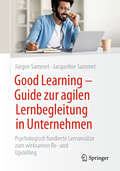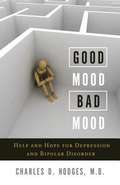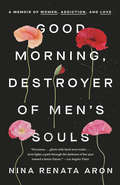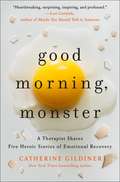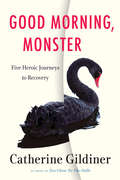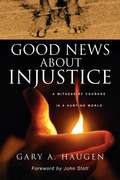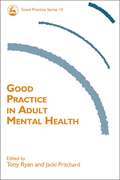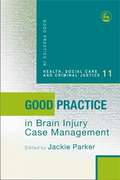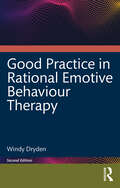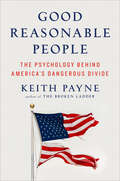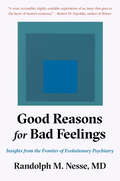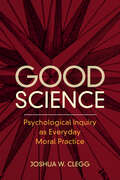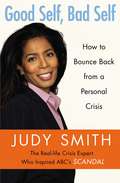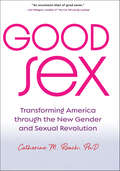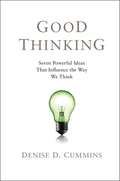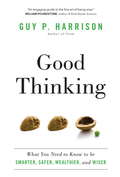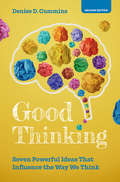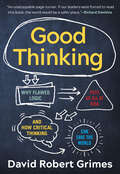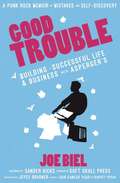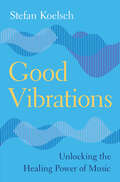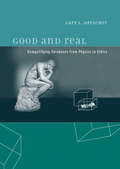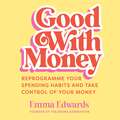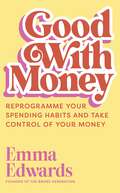- Table View
- List View
Good Learning - Guide zur agilen Lernbegleitung in Unternehmen: Psychologisch fundierte Lernansätze zum wirksamen Re- und Upskilling
by Jürgen Sammet Jacqueline SammetGood Learning - kontinuierliches Lernen und gezielte Kompetenzentwicklung - mit agiler Lernbegleitung zu wirksamem Re- und UpskillingDurch konsequente Fort- und Weiterbildung gelingt die Anpassung an die sich immer schneller wandelnden Anforderungen. Doch viele Lerntrends halten nicht, was sie versprechen und versanden wirkungslos.Fern von flüchtigen Moden vermittelt Ihnen dieses Buch bewährte, wissenschaftlich fundierte Lernansätze. Erfahren Sie, wie Sie mit dem Konzept der Agilen Lernbegleitung die drei entscheidenden E`s im betrieblichen Lernen umsetzen: Effektivität, Effizienz und Empowerment.Dieses Buch vermittelt Ihnen handfeste Anwendungsideen für eine zeitgemäße Learning Experience. Damit „Good Learning“ gelingt. Zielgruppen:HR-Verantwortliche, die innovative Lernstrategien implementieren möchten.Learning Professionals, die nachhaltige Lernkulturen schaffen wollen.Trainer:innen, die ihre Angebote an die moderne Lernlandschaft anpassen möchten.Führungskräfte, die die Entwicklung der Mitarbeitenden zielgerichtet unterstützen wollen.Teammitglieder, die für das Team-Lernen verantwortlich sind.Fachexpert:innen, die ihre Expertise weitergeben möchten.
Good Mood, Bad Mood: Help And Hope For Depression And Bipolar Disorder
by Charles HodgesDepression and bipolar disorder are two of the most common diagnoses made in medicine today. Good Mood, Bad Mood; examines whether we are in an epidemic or if we have simply misdiagnosed common sadness as depression. Current research in the medical community seems to indicate that the criteria we use to diagnose depression has resulted in an increased and incorrect labeling of common sadness as depression. While medical treatment is now the commonly accepted way to deal with pain and sadness, its promise has not been fulfilled. In Good Mood, Bad Mood, Dr. Charles Hodges offers an explanation to help the reader see the importance of sadness and the hope that God gives us in His Word.
Good Morning, Destroyer of Men's Souls: A Memoir of Women, Addiction, and Love
by Nina Renata AronA scorching memoir of a love affair with an addict, weaving personal reckoning with psychology and history to understand the nature of addiction, codependency, and our appetite for obsessive love &“The disease he has is addiction,&” Nina Renata Aron writes of her boyfriend, K. &“The disease I have is loving him.&” Their love affair is dramatic, urgent, overwhelming—an intoxicating antidote to the long, lonely days of early motherhood. Soon after they get together, K starts using again, and years of relapses and broken promises follow. Even as his addiction deepens, she stays, convinced she is the one who can get him sober. After an adolescence marred by family trauma and addiction, Nina can&’t help but feel responsible for those suffering around her. How can she break this pattern? If she leaves K, has she failed him? Writing in prose at once unflinching and acrobatic, Aron delivers a piercing memoir of romance and addiction, drawing on intimate anecdotes as well as academic research to crack open the long-feminized and overlooked phenomenon of codependency. She shifts between visceral, ferocious accounts of her affair with K and introspective analyses of the part she plays in his addictions, as well as defining moments in the history of codependency, from the temperance movement to the formation of Al-Anon to more recent research in the psychology of addiction. Good Morning, Destroyer of Men&’s Souls is a blazing, bighearted book that illuminates and adds nuance to the messy tethers between femininity, enabling, and love.
Good Morning, Monster: A Therapist Shares Five Heroic Stories of Emotional Recovery
by Catherine GildinerA Good Morning America SEPTEMBER 2020 READING LIST PICK"Catherine Gildiner is nothing short of masterful—as both a therapist and writer. In these pages, she has gorgeously captured both the privilege of being given access to the inner chambers of people's lives, and the meaning that comes from watching them grow into the selves they were meant to be."—Lori Gottlieb, New York Times bestselling author of Maybe You Should Talk to Someone In this fascinating narrative, therapist Catherine Gildiner’s presents five of what she calls her most heroic and memorable patients. Among them: a successful, first generation Chinese immigrant musician suffering sexual dysfunction; a young woman whose father abandoned her at age nine with her younger siblings in an isolated cottage in the depth of winter; and a glamorous workaholic whose narcissistic, negligent mother greeted her each morning of her childhood with "Good morning, Monster." Each patient presents a mystery, one that will only be unpacked over years. They seek Gildiner's help to overcome an immediate challenge in their lives, but discover that the source of their suffering has been long buried. As in such recent classics as The Glass Castle and Educated, each patient embodies self-reflection, stoicism, perseverance, and forgiveness as they work unflinchingly to face the truth. Gildiner's account of her journeys with them is moving, insightful, and sometimes very funny. Good Morning Monster offers an almost novelistic, behind-the-scenes look into the therapist's office, illustrating how the process can heal even the most unimaginable wounds.
Good Morning, Monster: Five Heroic Journeys to Recovery
by Catherine GildinerA therapist creates moving portraits of five of her most memorable patients, men and women she considers psychological heroes.Catherine Gildiner is a bestselling memoirist, a novelist, and a psychologist in private practice for twenty-five years. In Good Morning, Monster, she focuses on five patients who overcame enormous trauma--people she considers heroes. With a novelist's storytelling gift, Gildiner recounts the details of their struggles, their paths to recovery, and her own tale of growth as a therapist.The five cases include a successful but lonely musician suffering sexual dysfunction; a young woman whose father abandoned her and her siblings in a rural cottage; an Indigenous man who'd endured great trauma at a residential school; a young woman whose abuse at the hands of her father led to a severe personality disorder; and a glamorous workaholic whose negligent mother had greeted her each morning with "Good morning, Monster." Each patient presents a mystery, one that will only be unpacked over years. They seek Gildiner's help to overcome an immediate challenge in their lives, but discover that the source of their suffering has been long buried. It will take courage to face those realities, and creativity and resourcefulness from their therapist.Each patient embodies self-reflection, stoicism, perseverance, and forgiveness as they work unflinchingly to face the truth. Gildiner's account of her journeys with them is moving, insightful, and sometimes humorous. It offers a behind-the-scenes look into the therapist's office and explains how the process can heal even the most unimaginable wounds.
Good News About Injustice: A Witness of Courage in a Hurting World
by Gary A. HaugenGary Haugen says "the good news about injustice is that God is against it!" Offering his own and others' stories alongside proven, practical strategies, he shows how you too can stand against injustice wherever it occurs.
Good Practice in Adult Mental Health
by Tony Ryan Jacki Pritchard David HewittThis text is a guide to good practice within adult mental health care, providing a comprehensive introduction to mental health and illness. It is designed to aid mental health professionals and workers, agencies, and any individuals coming in to contact with mental illness, in recognising a mental health need or problem and offering appropriate support. This is an essential introduction written by practitioners, and also draws from the personal experiences of service users and carers, providing up-to-date and topical material covering major issues such as: * the concepts of mental health, illness and recovery * advocacy and empowerment * legal and policy issues relating to practice * gender and ethnicity in mental health * violence and abuse. The broad range of this book makes it an excellent resource for mental health practitioners, whether experienced or new to the field, support workers, students, and anyone interested in understanding the complexities of mental illness and the mental health system.
Good Practice in Brain Injury Case Management
by Jackie ParkerBrain injury case management involves the care and support of brain-injured individuals and their families in a range of areas, from personal injury litigation to the planning of treatment and therapy regimes. Good Practice in Brain Injury Case Management provides a guide to effective case management, outlining all the key issues that professionals working with brain-injured people will need to know, from understanding what brain injury actually is and how it feels to experience it to strategies for rehabilitation, assessing risk and implementing support plans. The contributors are drawn from a wide range of disciplines, including social work, neuropsychology, occupational therapy and legal practice, and offer information and advice in clear jargon-free. This is an essential handbook for case managers and all other professionals working with brain injured people.
Good Practice in Rational Emotive Behaviour Therapy
by Windy DrydenGood Practice in Rational Emotive Behaviour Therapy does exactly what it promises. It helps the Rational Emotive Behaviour Therapy (REBT) therapist to pinpoint areas of good practice enabling them to make progress towards becoming competent practitioners. Instead of focusing on what not to do in practice, this revised second edition instead emphasises what to do. Covering 101 areas of good practice, this thoroughly updated second edition places emphasis on developing and maintaining the therapeutic alliance, how to outline REBT for potential clients so that they can make an informed decision about whether to engage with the service and how to prepare clients to carry out their tasks in the therapy. A new focus is also placed on online therapy. This highly accessible and practical book is an indispensable guide for anyone embarking on a career in the REBT field.
Good Reasonable People: The Psychology Behind America's Dangerous Divide
by Keith Payne&“An eye-opening analysis of why our politics have become so polarized….Keith Payne illuminates one of the biggest problems of our time and lights the way toward some promising solutions.&” —Adam Grant, #1 New York Times bestselling author of Think Again "Good Reasonable People challenges each of us to drop the weapon of demonization and replace it with something more powerful: a framework for understanding—and for being understood by—people who see the world differently from us." —Margot Lee Shetterly, #1 New York Times bestselling author of Hidden FiguresA leading social scientist explains the psychology of our current social divide and how understanding it can help reduce the conflicts it causesThere has been much written about the impact of polarization on elections, political parties, and policy outcomes. But Keith Payne&’s goal is more personal: to focus on what our divisions mean for us as individuals, as families, and as communities. This book is about how ordinary people think about politics, why talking about it is so hard, and how we can begin to mend the personal bonds that are fraying for so many of us.Drawing upon his own research and his experience growing up in a working class, conservative Christian family in small town Kentucky, Payne argues that there is a near-universal human tendency to believe that people who are different from us are irrational or foolish. The fundamental source of our division is our need to flexibly rationalize ideas in order to see ourselves as good people. Understanding the psychology behind our political divide provides clues about how we can reduce the damage it is causing. It won&’t allow us to undo our polarization overnight, but it can give us the tools to stop going around in circles in frustrating arguments. It can help us make better choices about how we engage in political debates, how policy makers and social media companies deal with misinformation, and how we deal with each other on social media. It can help us separate, if we choose to, our political principles from our personal relationships so that we can nurture both.
Good Reasons for Bad Feelings: Insights from the Frontier of Evolutionary Psychiatry
by Randolph M. NesseA founder of the field of evolutionary medicine uses his decades of experience as a psychiatrist to provide a much-needed new framework for making sense of mental illness.Why do I feel bad? There is real power in understanding our bad feelings. With his classic Why We Get Sick, Dr. Randolph Nesse helped to establish the field of evolutionary medicine. Now he returns with a book that transforms our understanding of mental disorders by exploring a fundamentally new question. Instead of asking why certain people suffer from mental illness, Nesse asks why natural selection has left us all with fragile minds. Drawing on revealing stories from his own clinical practice and insights from evolutionary biology, Nesse shows how negative emotions are useful in certain situations, yet can become overwhelming. Anxiety protects us from harm in the face of danger, but false alarms are inevitable. Low moods prevent us from wasting effort in pursuit of unreachable goals, but they often escalate into pathological depression. Other mental disorders, such as addiction and anorexia, result from the mismatch between modern environment and our ancient human past. And there are good evolutionary reasons for sexual disorders and for why genes for schizophrenia persist. Taken together, these and many more insights help to explain the pervasiveness of human suffering, and show us new paths for relieving it by understanding individuals as individuals.
Good Science: Psychological Inquiry as Everyday Moral Practice
by Joshua W. CleggGood Science is an account of psychological research emphasizing the moral foundations of inquiry. This volume brings together existing disciplinary critiques of scientism, objectivism, and instrumentalism, and then discusses how these contribute to institutionalized privilege and to less morally responsive research practices. The author draws on historical, critical, feminist, and science studies traditions to provide an alternative account of psychological science and to highlight the irreducibly moral foundations of everyday scientific practice. This work outlines a theoretical framework for thinking about and practicing psychology in ways that center moral responsibility, collective commitment, and justice. The book then applies this framework, describing psychological research practices in terms of the their moral dilemmas. Also included are materials meant to aid in methods instruction and mentoring.
Good Self, Bad Self: How to Bounce Back from a Personal Crisis
by Judy SmithFrom the real-life crisis expert who inspired ABC's Scandal.Everyone must learn to live with personal missteps. Whether you've put yourself in an awkward situation, or you find that you've unwittingly created a full-blown crisis, Judy Smith is here to teach you how to look within to diffuse, mitigate, and resolve issues at their root. Good Self, Bad Self will teach you how to face and overcome potential problems before they send your life spinning out of control. Using the straightforward and incredibly effective POWER model--which incorporates the same strategies Judy uses with her high-profile clients--you can learn to master and expertly handle any sticky situation in your own life. Smith distills years of experience, sharing tools we all need to face our mistakes and overcome them.
Good Sex: Transforming America through the New Gender and Sexual Revolution
by Catherine M. RoachThe United States may have a puritanical past, but the 21st century is wide open to diverse gender expression and romance. Good Sex is the manifesto—or Manisexto, if you will—for this cultural revolution. Same-sex marriage is legal, the #MeToo movement has exploded, colleges nationwide now teach consent-based sexual health, the media celebrates body positivity, and transgender visibility has become mainstream. Defining "good sex" as both ethical and pleasurable, Catherine M. Roach features such topics as equity, intersectionality, and shared pleasure while offering a lively discussion that is inclusively feminist, queer-friendly, and sex-positive without being divisive.An accessible guidebook, Good Sex provides hope that America's sexual, gender, and racial injustices can be addressed together. After all, this new gender and sexual revolution strengthens the pursuit of happiness and love. Welcome to the revolution!
Good Teaching in Higher Education: Practical Tips for Planning and Designing Courses
by Immanuel UlrichHow do I plan my course? How can I inspire students? How do I present myself? How do I want to teach? How do I test correctly? What teaching methods are there?Due to the lack of comprehensive (university) didactic training, teachers too often have to answer these and many other questions for themselves. This book is intended to counteract this and presents practical tips on good university teaching for all disciplines based on the current state of research.
Good Thinking
by Denise CumminsDo you know what economists mean when they refer to you as a 'rational agent'? Or why a psychologist might label your idea a 'creative insight'? Or how a philosopher could be logical but also passionate in persuading you to obey 'moral imperatives'? Or why scientists disagree about the outcomes of experiments comparing drug treatments and disease risk factors? After reading this book, you will know how the best and brightest thinkers judge the ways we decide, argue, solve problems and tell right from wrong. But you will also understand why, when we don't meet these standards, it is not always a bad thing. The answers are rooted in the way the human brain has been wired over evolutionary time to make us kinder and more generous than economists think we ought to be, and more resistant to change and persuasion than scientists and scholars think we ought to be.
Good Thinking
by Guy P. HarrisonCritical-thinking skills are essential for life in the 21st century. In this follow-up to his introductory guide Think, and continuing his trademark of hopeful skepticism, Guy Harrison demonstrates in a detailed fashion how to sort through bad ideas, unfounded claims, and bogus information to drill down to the most salient facts. By explaining how the human brain works, and outing its most irrational processes, this book provides the thinking tools that will help you make better decisions, ask the right questions (at the right time), know what to look for when evaluating information, and understand how your own brain subconsciously clouds your judgment. Think you're too smart to be easily misled? Harrison summarizes scientific research showing how easily even intelligent and well-educated people can be fooled. We all suffer from cognitive biases, embellished memories, and the tendency to kowtow to authority figures or be duped by dubious 'truths' packaged in appealing stories. And as primates we are naturally status seekers, so we are prone to irrational beliefs that seem to enhance our sense of belonging and ranking. Emotional impulses and stress also all too often lead us into traps of misperception and bad judgment. Understanding what science has discovered about the brain makes you better equipped to cope with its built-in pitfalls. Good Thinking--the book and the practice-- makes clear that with knowledge and the right thinking skills, anyone can lead a safer, wiser, more efficient, and productive life.From the Trade Paperback edition.
Good Thinking: Seven Powerful Ideas That Influence the Way We Think
by Denise D. CumminsThis book is for anyone who wonders whether to trust the media, seeks creative solutions to problems, or grapples with ethical dilemmas. Cognitive scientist Denise D. Cummins clearly explains how experts in economics, philosophy, and science use seven powerful decision-making methods to tackle these challenges. These techniques include: logic, moral judgment, analogical reasoning, scientific reasoning, rational choice, game theory and creative problem solving. Updated and revised in a second edition, each chapter now features quizzes for course use or self-study.
Good Thinking: Why Flawed Logic Puts Us All At Risk And How Critical Thinking Can Save The World
by David Robert GrimesGood Thinking is our best defense against anti-vaccine paranoia, climate denial, and other dire threats of today Publisher’s Note: Good Thinking was previously published in the UK as The Irrational Ape. In our ever-more-polarized society, there’s at least one thing we still agree on: The world is overrun with misinformation, faulty logic, and the gullible followers who buy into it all. Of course, we’re not among them—are we? Scientist David Robert Grimes is on a mission to expose the logical fallacies and cognitive biases that drive our discourse on a dizzying array of topics–from vaccination to abortion, 9/11 conspiracy theories to dictatorial doublespeak, astrology to alternative medicine, and wrongful convictions to racism. But his purpose in Good Thinking isn’t to shame or place blame. Rather, it’s to interrogate our own assumptions–to develop our eye for the glimmer of truth in a vast sea of dubious sources–in short, to think critically. Grimes’s expert takedown of irrationality is required reading for anyone wondering why bad thinking persists and how we can defeat it. Ultimately, no one changes anyone else’s mind; we can only change our own–and give others the tools to do the same.
Good Trouble: Building a Successful Life and Business with Asperger's (Punx Ser.)
by Sander Hicks Joe Biel Joyce Brabner<p>In 1996, everything about Joe Biel's life seemed like a mistake. He was 18, he lived in Cleveland, he got drunk every day, and he had mystery health problems and weird social tics. <p>All his friends' lives were as bad or worse. To escape a nihilistic, apocalyptic worldview and to bring reading and documentation into a communal punk scene, he started assembling zines and bringing them in milk crates to underground punk shows. Eventually this became Microcosm Publishing. But Biel's head for math was stronger than his ability to relate to people, and it wasn't until he was diagnosed with Asperger's Syndrome that it all began to fall into place. <p>This is the story of how, over 20 years, one person turned a litany of continuing mistakes and seeming wrong turns into a happy, fulfilled life and a thriving publishing business that defies all odds.</p>
Good Vibrations: Unlocking the Healing Power of Music
by Stefan KoelschThough used as a healing practice for centuries, only recently have we begun to unravel the science behind music's profound impact on the mind and body. In this book, neuroscientist Stefan Koelsch explores the groundbreaking research behind music's influence on human wellbeing: emotional, physical, and psychological. Beginning with an account of the human brain's innate capacity for music, Koelsch explains music's potential to evoke emotions and change our moods, soothe anxiety and alleviate pain. Featuring case studies, he documents the potential of music therapy for a wide range of conditions like depression, stroke recovery, and Alzheimer's. Filled with fascinating science and concrete tips and strategies, this book encourages anyone to harness the power of music for personal growth, healing, and joy.
Good and Real: Demystifying Paradoxes from Physics to Ethics (Bradford Bks.)
by Gary L. DrescherExamining a series of provocative paradoxes about consciousness, choice, ethics, and other topics, Good and Real tries to reconcile a purely mechanical view of the universe with key aspects of our subjective impressions of our own existence.In Good and Real, Gary Drescher examines a series of provocative paradoxes about consciousness, choice, ethics, quantum mechanics, and other topics, in an effort to reconcile a purely mechanical view of the universe with key aspects of our subjective impressions of our own existence.Many scientists suspect that the universe can ultimately be described by a simple (perhaps even deterministic) formalism; all that is real unfolds mechanically according to that formalism. But how, then, is it possible for us to be conscious, or to make genuine choices? And how can there be an ethical dimension to such choices? Drescher sketches computational models of consciousness, choice, and subjunctive reasoning—what would happen if this or that were to occur?—to show how such phenomena are compatible with a mechanical, even deterministic universe. Analyses of Newcomb's Problem (a paradox about choice) and the Prisoner's Dilemma (a paradox about self-interest vs. altruism, arguably reducible to Newcomb's Problem) help bring the problems and proposed solutions into focus. Regarding quantum mechanics, Drescher builds on Everett's relative-state formulation—but presenting a simplified formalism, accessible to laypersons—to argue that, contrary to some popular impressions, quantum mechanics is compatible with an objective, deterministic physical reality, and that there is no special connection between quantum phenomena and consciousness.In each of several disparate but intertwined topics ranging from physics to ethics, Drescher argues that a missing technical linchpin can make the quest for objectivity seem impossible, until the elusive technical fix is at hand.
Good with Money: Reprogramme Your Spending Habits and Take Control of Your Money
by Emma EdwardsHave you ever avoided looking at your banking app after a big night out? Placed an online order during a late-night doomscroll? Felt helpless when your new budget simply failed to stick, despite your best intentions?If that sounds familiar, this is the book for you. In the age of smartphones and social media, we're surrounded by an endless stream of stuff we could buy, not to mention social conditioning around what makes us happy, as well as fast fashion, algorithmic advertising and 'where did you get that?' culture.Financial behaviour expert Emma Edwards will help you unpack the reasons you're so emotionally tangled with your money (spoiler: it's absolutely not your fault) and look at what might be keeping you stuck. She'll teach you to reclaim your decision-making, deep-dive into your beliefs, identity and habits, and come out the other side feeling 'good with money'.With a step-by-step guide to creating a money management system that actually works, Good With Money will change the way you think about budgeting, consumption and yourself, and put you back in the driver's seat of your own financial future.
Good with Money: Reprogramme Your Spending Habits and Take Control of Your Money
by Emma EdwardsHave you ever avoided looking at your banking app after a big night out? Placed an online order during a late-night doomscroll? Felt helpless when your new budget simply failed to stick, despite your best intentions?If that sounds familiar, this is the book for you. In the age of smartphones and social media, we're surrounded by an endless stream of stuff we could buy, not to mention social conditioning around what makes us happy, as well as fast fashion, algorithmic advertising and 'where did you get that?' culture.Financial behaviour expert Emma Edwards will help you unpack the reasons you're so emotionally tangled with your money (spoiler: it's absolutely not your fault) and look at what might be keeping you stuck. She'll teach you to reclaim your decision-making, deep-dive into your beliefs, identity and habits, and come out the other side feeling 'good with money'.With a step-by-step guide to creating a money management system that actually works, Good With Money will change the way you think about budgeting, consumption and yourself, and put you back in the driver's seat of your own financial future.
Good with Money: Reprogramme Your Spending Habits and Take Control of Your Money
by Emma EdwardsHave you ever avoided looking at your banking app after a big night out? Placed an online order during a late-night doomscroll? Felt helpless when your new budget simply failed to stick, despite your best intentions?If that sounds familiar, this is the book for you. In the age of smartphones and social media, we're surrounded by an endless stream of stuff we could buy, not to mention social conditioning around what makes us happy, as well as fast fashion, algorithmic advertising and 'where did you get that?' culture.Financial behaviour expert Emma Edwards will help you unpack the reasons you're so emotionally tangled with your money (spoiler: it's absolutely not your fault) and look at what might be keeping you stuck. She'll teach you to reclaim your decision-making, deep-dive into your beliefs, identity and habits, and come out the other side feeling 'good with money'.With a step-by-step guide to creating a money management system that actually works, Good With Money will change the way you think about budgeting, consumption and yourself, and put you back in the driver's seat of your own financial future.
